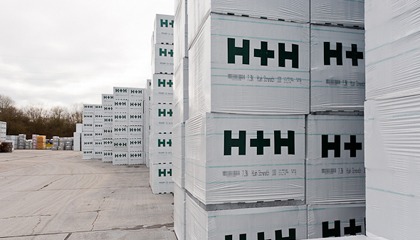Construction sites across the UK are being hit by a concrete block shortage as pressure on raw materials means manufacturers are struggling to keep up with demand.
PFA – a by-product of coal-fired power generation is a key material in the manufacture of most concrete blocks but a move towards alternative forms of energy generation such as gas, nuclear or renewable technologies has resulted in a gradual reduction in the number of coal fired power stations and a consequent reduction in the production of PFA.
Calum Forsyth, managing director of aircrete building solutions manufacturer explains: “PFA – a by-product of coal-fired power generation – is used as a raw material by most concrete manufacturers in the UK, with aircrete being no exception. The fact that our own aircrete blocks are largely comprised of this material has always provided a positive differentiation in the market place.
“As supplies of fresh PFA have become less readily available, we are developing our manufacturing processes to enable the use of stockpiled PFA. There is a considerable quantity of such material, built up over the previous century when the UK relied primarily on coal to generate power and was unable to re-use the quantity of PFA produced in the process.
“Stockpiled PFA does not have the same performance characteristics as the fresh material and has required us to initiate changes to our production processes to enable us to utilise it. While we have been implementing these changes we have simultaneously negotiated purchasing contracts to ensure we have a secured supply of the product for the foreseeable future.
“However, this winter an unprecedented set of circumstances has led to a sudden reduction in the availability of fresh PFA. A warm winter, combined with exceptionally low gas prices reduced the operation of our remaining coal-fired power stations to unusually low levels. This coincided with the most buoyant construction sector since the economic collapse of 2008, while the mild winter allowed contractors to keep on site throughout a period traditionally marked by a weather-induced slowdown.
“The inevitable result is a short-term pressure on supply. While H+H is able to utilise stockpiled PFA we have had to accelerate the development of our production process to accommodate the different characteristics of this raw material. As with any significant change to manufacturing, this has required considerable adjustments to ensure the quality of the finished product is acceptable.
“The net result is a reduction in yield. While our plants are still producing around 30% more volume than was the case four years ago, we are facing pressure to supply the growing demand.
“For H+H this is a short-term difficulty. As we refine our processes to speed production using stockpiled PFA our output is increasing; to ease the immediate situation we are working with our plants in Europe to establish an ongoing supply of imported product. Throughout the winter, a more normal gas supply market and more typical seasonal temperatures should increase the volume of PFA production once more, which should ease the situation for all manufacturers.
“In the immediate future, we are focusing on directing all of our output to the customers with whom we have long-term supply contracts in place. This will mean increased pressure on the spot-market for blocks for those who do not have agreements with H+H.”




